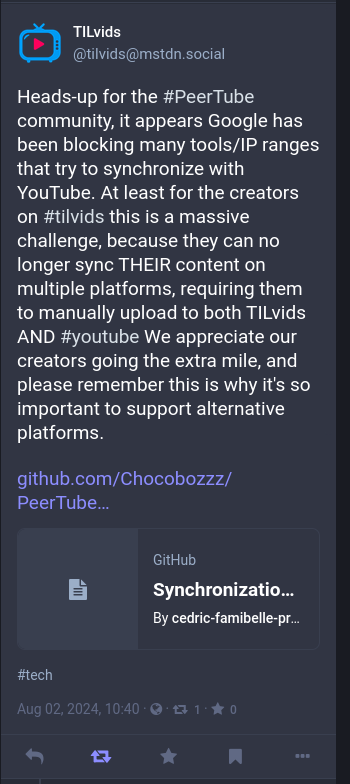this post was submitted on 17 Sep 2024
906 points (99.6% liked)
Technology
59201 readers
2503 users here now
This is a most excellent place for technology news and articles.
Our Rules
- Follow the lemmy.world rules.
- Only tech related content.
- Be excellent to each another!
- Mod approved content bots can post up to 10 articles per day.
- Threads asking for personal tech support may be deleted.
- Politics threads may be removed.
- No memes allowed as posts, OK to post as comments.
- Only approved bots from the list below, to ask if your bot can be added please contact us.
- Check for duplicates before posting, duplicates may be removed
Approved Bots
founded 1 year ago
MODERATORS
you are viewing a single comment's thread
view the rest of the comments
view the rest of the comments

Maybe a stupid question, but how do paid streaming services avoid that issue?
Not the OP, and I don't actually know, but paid streaming services differ from YouTube in that everyone who accesses the content is paying for the service. On one hand, you can validate that everytime a video is served, it's served to a paying user. On the other, you are receiving revenue directly from consumers to fund the infrastructure to store and serve the videos.
YouTube, on the other hand, stores significantly more content, for free, and can be accessed for free, without being signed in.
The "without being signed in" part of YouTube is now no longer completely true. I tried to watch a video tutorial at work the other day and it wouldn't play because I wasn't signed in and so "they couldn't be sure I wasn't a bot". I'm not signing into any personal stuff on my work computer, or wasting time creating a "work" Google account, so I guess YT can no longer be a place where I can get helpful programming info.
That might have been because of your IT team. You can absolutely watch YouTube videos without being signed in. I do it all the time.
YT likely recognized the IP as belonging to a commercial entity and threw up the block, due to bot concerns, over that .
Possibly yeah
I guess they have no decentralized CDNs as YouTube does, but... paid streaming services still have their weaknesses (there certainly are tools that fetches content from there because of, e.g: entire Netflix movies/series became torrents without screen recording).
The financial insensitive to ensure only paying users can access the content offsets the cost of the different infrastructure.
YouTube needs to make money as cheaply as possible. They can't afford the processing to guarantee ad delivery and secure content like that.
If the infrastructure/delivery cost of securing content goes up, streaming services can raise their prices.
YT can't really serve more ads. The platform is already pretty packed with ads
They say to hold their beer and watch this...